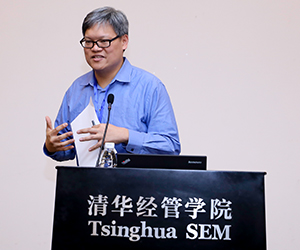 |
| Paul Gillis |
Oversight of Chinese companies listed in the US has been ongoing troublesome, as auditors miss access to much information considered a state-secret in China.
Peking University accounting professor Paul Gillis told the U.S.-China Security and Economic Commission 26 January how to solve the conundrum.
(here in pdf)
Paul Gillis:
In my opinion, the major problem with respect to U.S. listed Chinese companies is the inability of the PCAOB to conduct inspections of China based accounting firms. This has resulted in a situation where there is a double standard in regulation. All auditors of companies listed in the U.S. must be inspected, except for auditors of Chinese companies (and companies of a few other minor countries), which are not inspected. While this fact is routinely disclosed in the issuer’s filings, the double standard makes a mockery of U.S. regulation.
In my view, there are two alternatives to eliminate the double standards. First, Sarbanes Oxley could be amended to remove the requirement that the PCAOB inspect foreign accounting firms. Instead, the PCAOB could follow the lead of the European Union and negotiate regulatory equivalency under which the PCAOB would accept the work of Chinese regulators as their own. I do not think this is the best option, since I think it is unlikely that Chinese regulators will rigorously examine overseas listed companies nor do they have the necessary expertise in U.S. accounting and auditing rules.
The second option is to terminate the registration with the PCAOB of any auditors that the PCAOB is unable to inspect. The U.S. should require companies that seek to list in the U.S. to agree to follow all U.S. laws. If China determines that a company has state secrets that cannot be disclosed, a company with such secrets should not be permitted to list in the U.S.
Termination of accounting firm registrations would lead to the delisting of shares of companies audited by the deregistered firms, since financial statements audited by a PCAOB registered accounting firm are a requirement for continued listing. Delisted companies are likely to seek to relist in China or Hong Kong, although they may be required to restructure to eliminate control structures and/or variable interest entity arrangements that may not be permitted in the other jurisdiction. The PCAOB has so far been unwilling to go this far, likely due to opposition from capital markets.
Another problem with U.S. regulation is the overlapping jurisdiction of financial regulators. There is little secret that there is considerable tension between the SEC and the PCAOB. I believe this both confuses Chinese regulators as well as creating opportunities for Chinese bureaucrats to play one regulator off the other. I think Congress should consider abolishing the PCAOB, transferring the inspection and enforcement activities to the SEC and sending standard setting back to the American Institute of CPAs.
The full statement by Paul Gillis.(pdf)
Paul Gillis is a speaker at the China Speakers Bureau. Do you need him at your meeting or conference? Do get in touch or fill in our speakers´request form.
Are you looking for more experts to manage your China risk at the China Speakers Bureau? Do check out this list.
































